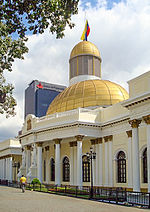National Assembly (Venezuela)
| logo | Parliament building |
|---|---|

|

|
| Basic data | |
| Seat: | Palacio Federal Legislativo , Caracas |
| MPs: | 167 |
| Current legislative period | |
| Last choice: | 2015 |
| Chair: | Juan Guaidó , VP ( MUD ) |

|
|
| Distribution of seats: |
|
The National Assembly of Venezuela (Spanish Asamblea Nacional ) has been the parliament in Venezuela since 1999 and has its seat in the Palacio Federal Legislativo in Caracas .
167 MPs ( diputados ) are elected to the unicameral system for five years.
Juan Guaidó ( VP / MUD ) has been President of the National Assembly since January 2019 .
Parties
The list of parties in Venezuela gives an overview .
history
Today's National Assembly was introduced with the Bolivarian Constitution of 1999 and replaced the previous two-chamber system . Since the constitution of 1961 , the Congress (Congreso) had been composed of the Senate and the Chamber of Deputies (Cámara de Diputados).
On March 30, 2017, the Supreme Court revoked the powers of the National Assembly and transferred them to itself. The ruling was based on the fact that the National Assembly disregarded the constitution and did not cooperate with other state authorities.
For months, the MUD majority in the National Assembly had been aiming for a referendum on the impeachment of the socialist President Nicolás Maduro . The parliament concerned speaks of a coup and sees Venezuela drift further into a dictatorship . After the court decision, the President of Parliament Julio Borges declared that President Maduro was not allowed to stand above the constitution and called on the military, who had previously been with Maduro, to break its silence in view of the “breach of the constitution”. The Organization of American States (OAS) and the United States condemned the disempowerment of parliament. OAS Secretary General Luis Almagro spoke of a "coup" with which the government was undermining the constitutional order and democracy.
Shortly thereafter, the Supreme Court initially revised Parliament's disempowerment.
On August 18, 2017, the opposition-dominated parliament was officially ousted. The pro-government Constituent Assembly adopted a decree by which the body took over the duties of parliament for an indefinite period of time. This means that Parliament no longer has any decision-making power. At the same time, investigations were launched against Julio Borges and Freddy Guevara , President and Vice-President of Parliament. They were accused of resisting President Maduro by refusing, as a congressional leader, to swear allegiance to the "Constituent Assembly". Exactly this "Constituent Assembly" decided unanimously to lift the immunity of other members of the National Assembly. In December 2019, no fewer than 20 parliamentarians in the National Assembly were prosecuted for suspected crimes such as treason, conspiracy or calls for rebellion.
Web links
Individual evidence
- ↑ Venezuela: Supreme Court overturns parliament , Spiegel Online , March 30, 2017.
- ↑ "That is nothing more than a coup and dictatorship in Venezuela" , the press , March 30, 2017th
- ↑ Venezuela: International outrage over the disempowerment of parliament , Frankfurter Allgemeine Zeitung , March 31, 2017.
- ↑ Venezuela: Supreme Court revises the disempowerment of parliament , Die Zeit Online, April 1, 2017.
- ^ Opposition sidelined: Venezuela's parliament officially disempowered , Tagesschau.de , archived August 19, 2017.
- ↑ Criminal proceedings for rebellion against MPs in Venezuela , NZZ, December 17, 2019
Coordinates: 10 ° 30 ′ 19.9 ″ N , 66 ° 54 ′ 57 ″ W.

